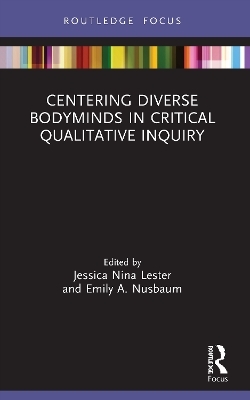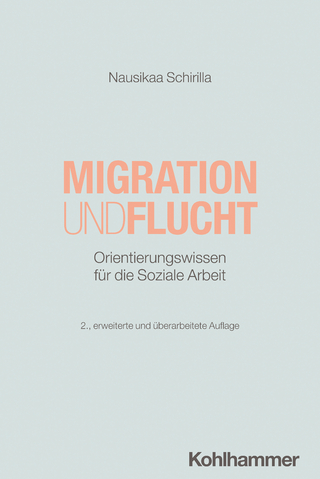
Centering Diverse Bodyminds in Critical Qualitative Inquiry
Seiten
2024
Routledge (Verlag)
978-1-032-04125-4 (ISBN)
Routledge (Verlag)
978-1-032-04125-4 (ISBN)
This book advances qualitative methods and methodological discussions from the ways in which “disabled people” are viewed primarily as research subjects without input of their own, to a place where disability embodiment and the lived experience of disability are potential sources of method and methodological advancement.
Awarded the 2022 American Educational Studies Association Critics' Choice Book Award.
Centering Diverse Bodyminds in Critical Qualitative Inquiry directly responds to the call for engaging in a new critical qualitative inquiry with consideration to issues related to power, privilege, voice, identity, and agency, while examining the hegemonic power of ableism and ableist epistemologies.
The contributing authors of this edited volume advance qualitative methods and methodological discussions to a place where disability embodiment and the lived experience of disability are potential sources of method and methodological advancement. Accordingly, this book centers disability, and, in so doing, examines methodological challenges related to normative and ableist assumptions of doing qualitative research. The range of chapters included highlights how there is no singular answer to questions about qualitative method and methodology; rather, the centering of diverse bodyminds complicates the normative desire to create method/methodology that is “standard,” versus thinking about method and methodology as fluid, emerging, and disruptive.
As an interdisciplinary text on critical qualitative research and disability studies with an international appeal, Centering Diverse Bodyminds in Critical Qualitative Inquiry is valuable for graduate level students and academics within a broad range of fields including critical qualitative research methodologies and methods, disability studies, cultural studies, discourse studies, education, sociology, and psychology. Disciplines that engage in the teaching of qualitative research methodologies and methods, particularly those that foreground critical qualitative research perspectives, will also find the book appealing.
Awarded the 2022 American Educational Studies Association Critics' Choice Book Award.
Centering Diverse Bodyminds in Critical Qualitative Inquiry directly responds to the call for engaging in a new critical qualitative inquiry with consideration to issues related to power, privilege, voice, identity, and agency, while examining the hegemonic power of ableism and ableist epistemologies.
The contributing authors of this edited volume advance qualitative methods and methodological discussions to a place where disability embodiment and the lived experience of disability are potential sources of method and methodological advancement. Accordingly, this book centers disability, and, in so doing, examines methodological challenges related to normative and ableist assumptions of doing qualitative research. The range of chapters included highlights how there is no singular answer to questions about qualitative method and methodology; rather, the centering of diverse bodyminds complicates the normative desire to create method/methodology that is “standard,” versus thinking about method and methodology as fluid, emerging, and disruptive.
As an interdisciplinary text on critical qualitative research and disability studies with an international appeal, Centering Diverse Bodyminds in Critical Qualitative Inquiry is valuable for graduate level students and academics within a broad range of fields including critical qualitative research methodologies and methods, disability studies, cultural studies, discourse studies, education, sociology, and psychology. Disciplines that engage in the teaching of qualitative research methodologies and methods, particularly those that foreground critical qualitative research perspectives, will also find the book appealing.
Introduction 1 (Re)framing Qualitative Research as a Prickly Artichoke: Peeling Back the Layers of Structural Ableism within the Institutional Research Process, Brianna Dickens and Holly Pearson 2 Bodymind Legibility and the Possibilities of Qualitative Research, Emily Nusbaum and Jessica Nina Lester 3 Sign Language Transcription and Qualitative Research Methodologies, Stephanie Kerschbaum 4 When Participatory Approaches are Inaccessible: Creating Space for Both Individual and Group Engagement, Kathleen Sitter 6 Alice Wong, Disability Visibility: Qualitative Methods, Online Archives, and Advocacy
| Erscheinungsdatum | 14.08.2022 |
|---|---|
| Reihe/Serie | Developing Traditions in Qualitative Inquiry |
| Zusatzinfo | 16 Halftones, black and white; 16 Illustrations, black and white |
| Verlagsort | London |
| Sprache | englisch |
| Maße | 138 x 216 mm |
| Gewicht | 199 g |
| Themenwelt | Geisteswissenschaften ► Psychologie |
| Sozialwissenschaften ► Pädagogik ► Sozialpädagogik | |
| Sozialwissenschaften ► Politik / Verwaltung ► Staat / Verwaltung | |
| Sozialwissenschaften ► Soziologie ► Empirische Sozialforschung | |
| ISBN-10 | 1-032-04125-0 / 1032041250 |
| ISBN-13 | 978-1-032-04125-4 / 9781032041254 |
| Zustand | Neuware |
| Haben Sie eine Frage zum Produkt? |
Mehr entdecken
aus dem Bereich
aus dem Bereich
Grundlagen - Konzepte - Methoden
Buch | Softcover (2023)
Kohlhammer (Verlag)
CHF 47,60
ein Lehrbuch zum Kita-Management
Buch | Softcover (2023)
Kohlhammer (Verlag)
CHF 64,40
Orientierungswissen für die Soziale Arbeit
Buch | Softcover (2024)
Kohlhammer (Verlag)
CHF 49,95


